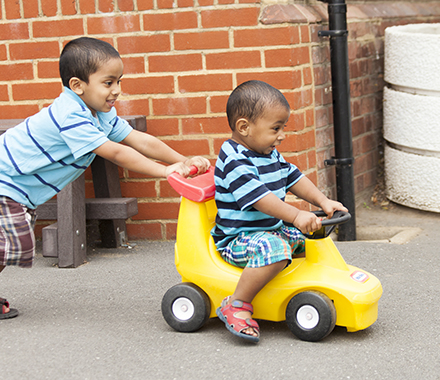The Hub
Physical Development
Active children are healthy, happy, learn and sleep better. This page provides guidance for early years settings and schools on the importance of physical activity.
Children under five should not be inactive for long periods, except when they're asleep. Watching TV, travelling by car, bus or train, or being strapped into a buggy for long periods are not good for a child's health and development.
- NHS, UK
Early Years (birth to 5 years)
Department of Health guidance states children under 5 who are capable of walking should be active for at least three hours per day and should limit the amount of time spent sitting still. All movement counts towards the three hours and it can be spread across the whole day.
The benefits of physical activity include:
- builds relationships and social skills
- contributes to brain development and learning
- improves sleep
- develops muscles and bones
- encourages movement and co-ordination
Building Active Opportunities into Everyday Activities
Create opportunities for children to be active throughout the day without detracting from the other early learning goals; physical activity can be a part of everything you do. Think about the activities you already deliver as part of the EYFS curriculum and how you can make these more active.
For example, literacy activities could include going on a treasure hunt for sticks and forming letters with these sticks in mud or sand. Numeracy activities could include throwing beanbags into hoops containing different numbers. Nursery rhymes and action songs can be made more active to include gross as well as fine motor skills and babies could enjoy tummy time at story time.
Young People (5 - 18 years )
Department for Health guidance states that to maintain a basic level of health, children and young people aged 5 to 18 need to do:
- at least 60 minutes of physical activity every day – this should range from moderate activity, such as cycling and playground activities, to vigorous activity, such as running and tennis
- on 3 days a week, these activities should involve exercises for strong muscles and bones, such as swinging on playground equipment, hopping and skipping, and sports such as gymnastics or tennis
Being active for at least 60 minutes a day is linked to
- better general health
- stronger bones and muscles
- higher levels of self-esteem
Resources
Children and young people should take part in activities appropriate for their age and stage of development.
For further information and activity ideas visit the NHS website.


